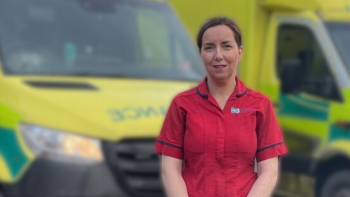23rd January 2025

After a particular busy January Sister Lisa Small, Ward Manager in Daisy Hill Hospital’s Emergency Department, gives an insight to what it has been like for staff working at the frontline of health and social care.
“The current pressures on hospital and community services are on a scale never seen before. Staff are working very hard in extreme circumstances to protect the safety and dignity of services for patients. With limited space and resources, this volume of sick patients makes it an increasingly difficult daily challenge.
“We are also very conscious of the pressure that our colleagues in the Northern Ireland Ambulance Service are under to get to their next call, so do our best to work with paramedics to transfer patients into the Department as quickly as we possibly can.
“At times, we have to use extra trolleys, chairs and beds in our EDs, wards and any extra space within our hospitals, often resorting to corridors and other non-clinical areas, to try and cope the demand to accommodate this high volume of patients.
“Whilst the use of additional spaces is risk assessed, this not the standard we want in providing services and it can be distressing for both patients and staff. Our priority remains in providing the best possible care and treatment to patients.”
With large numbers of people attending ED Lisa explained that priority is given to the sickest patients waiting to be seen and that means some people may have to wait longer that they would like.
“We are seeing very many acutely ill patients and more cases of respiratory and flu like illnesses.
“Staff are working hard to prioritise the sickest patients and identify beds for those who need admitted to a ward.”
Choosing the right service for you could save you an unnecessary wait in ED. Lisa highlighted Phone First, Pharmacy First and GPs as alternatives to a visit to ED.
“I would urge anyone eligible to get vaccinated to reduce the spread of flu, COVID-19 and RSV. This can reduce the chances of illness for you and those around you and can also help with pressures on our services.
“We ask people only to come to our EDs if you have serious symptoms that need hospital care and phone first (Monday to Friday 9am to 9pm) before travelling to our EDs or Minor Injuries service with less urgent symptoms. Tel: 0300 123 3 111.
“Consider if your condition could be treated by your pharmacist or GP. Please avoid visiting loved ones in health care facilities if you or your family have symptoms of cold, flu, vomiting or diarrhoea and always practice good hand hygiene to prevent the spread of infection.
“This year is particularly busy, we are seeing a lot of respiratory illness, flu and covid in the community. Staff are doing everything they can in difficult circumstances to protect the safety and dignity of our services for patients.
“Challenges faced at Daisy Hill Emergency Department and throughout the hospital are common across the region and throughout the UK.
“We are doing everything we can to reduce pressure on our busy Emergency Departments, working to improve our range of community services, unscheduled care like the Phone First service, and same day emergency care services like the new ambulatory unit and acute care at home service, to avoid hospital admission and improve patient flow where possible.”
The challenges facing Health and Social Care are not exclusive to our hospitals, with community services also managing an increasing demand. Lisa highlighted that support from families can make a difference to their loved one’s wellbeing by supporting discharge and reducing a stay in hospital.
“We do recognise that there are also challenges in community care, which can cause delays in patients being discharged from hospital. Every hospital bed is precious and we greatly welcome public support in ensuring that the sickest patients get the care they need as we continue through this winter period.
“Research shows that an extended hospital stay can cause deconditioning, reduce independence, increase the risk of confusion, falls and infection.
“It is essential that patients leave hospital and families support with discharge as soon as their loved one is medically fit, where they can. There is another sick patient, in the ED who needs the bed on a hospital ward. This may mean accepting an alternative package or care home placement while waiting for a preferred longer-term option.”




